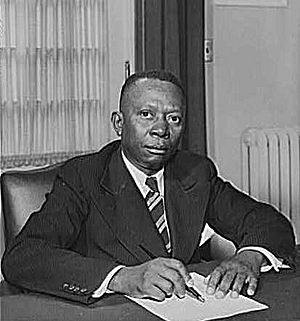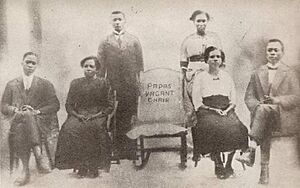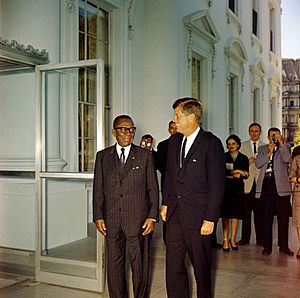William Tubman facts for kids
Quick facts for kids
William Tubman
|
|
|---|---|

Tubman in 1943
|
|
| 19th President of Liberia | |
| In office 3 January 1944 – 23 July 1971 |
|
| Vice President | Clarence Lorenzo Simpson (1944–1952) William Tolbert (1952–1971) |
| Preceded by | Edwin Barclay |
| Succeeded by | William Tolbert |
| Personal details | |
| Born |
William Vacanarat Shadrach Tubman
29 November 1895 Harper, Liberia |
| Died | 23 July 1971 (aged 75) London, England |
| Resting place | National Hall |
| Political party | True Whig |
| Spouses | Martha Aletha Rhoda Pratt-Tubman Antoinette Tubman (1948–1971; his death) |
William Vacanarat Shadrach Tubman (born November 29, 1895 – died July 23, 1971) was a very important politician in Liberia. He served as the 19th president of Liberia. He was the longest-serving president in Liberia's history, holding office from 1944 until his death in 1971.
Many people call Tubman the "father of modern Liberia." During his time as president, he brought a lot of foreign money into the country. This helped to make Liberia's economy and roads much better. Liberia became a richer country while he was in charge. He also worked to bring different groups of people in Liberia together. He wanted to reduce the differences between the Americo-Liberians and the native Liberians.
Contents
William Tubman: His Early Life
William Tubman was born in Harper on November 29, 1895. His grandfather, Alexander Tubman, was a stonemason and a general in the Liberian army. He was also a former Speaker of the Liberian House of Representatives. Alexander was a strict person. He made his children attend daily prayers and sleep on the floor. He believed soft beds were bad for building character.
Tubman's mother, Elizabeth Rebecca Tubman, was from Atlanta, USA. William's great-grandparents, Sylvia and William Shadrach Tubman, were formerly enslaved people. They were among 69 freed slaves whose trip to Liberia in 1844 was paid for. This was done by their former owner, Emily Harvie Thomas Tubman. She was a kind widow and philanthropist from Augusta, Georgia.
Emily Tubman worked hard to free her enslaved people and send them to Liberia. This was a way for them to return to Africa. After arriving in Liberia, these freed people took "Tubman" as their last name. They settled together and named their community Tubman Hill after Emily.
Becoming a Leader
William Tubman went to primary school in Harper. He then attended the Methodist Cape Palmas Seminary and Harper County High School. From 1910 to 1917, when he was 15 to 22 years old, he joined several military actions in Liberia. He was promoted from a private soldier to an officer.
At age 19, Tubman became a Methodist lay preacher. He had planned to become a preacher. He also studied law with different private teachers. In 1917, he passed the bar examination and became a lawyer.
Tubman quickly got jobs as a recorder in a court and a tax collector. He also worked as a teacher and a colonel in a militia. He was a member of the Freemasons.
His Political Career
Tubman joined the True Whig Party (TWP). This party was the main political party in Liberia since 1878. In 1923, at 28 years old, he was elected to the Senate of Liberia. He was the youngest senator in Liberia's history. He worked to get constitutional rights for people from native tribal groups. These groups made up most of Liberia's population.
He was re-elected as senator in 1929. Tubman then became a legal advisor to the vice president. In 1931, he left the Senate to defend Liberia. This was before the League of Nations because of claims that Liberia was using slave labor. Tubman was elected to the national legislature again in 1934. He resigned in 1937 after President Edwin Barclay made him an associate justice of the Supreme Court of Liberia. He served there until 1943.
President of Liberia
In December 1942, Liberia needed to choose a new president. Six people ran for the job. William Tubman and Foreign Minister Clarence L. Simpson were the top two choices. Tubman was elected president on May 4, 1943. He was 48 years old. He officially started his term on January 3, 1944.
The United States, a friend of Liberia, started military operations in the country during World War II. Liberia did not declare war on Germany and Japan until January 27, 1944. In April 1944, Liberia joined the Allied side. They signed the Declaration by United Nations.
It was a tough choice for Tubman to end relations with Germany. German traders were very important to Liberia's economy. Germany was Liberia's biggest trading partner. Also, most doctors in Liberia were German. But under the declaration, Tubman agreed to send all German residents away and oppose the Axis powers.
Foreign Relations
Tubman made Liberia a close friend of the US. He called the US "Our strongest, closest, and most reliable friend." In June 1944, he and former president Edwin Barclay visited the White House. They were guests of President Franklin D. Roosevelt. They were the first African leaders to be welcomed there.
After World War II, many African countries wanted to be free from colonial rule. Tubman worked to make ties stronger among African nations. He took part in the Asian-African Conference in 1955. He also attended the First Conference of Independent African States in Accra in 1958. This conference was organized by Kwame Nkrumah of Ghana. In 1959, Tubman organized the Second Conference of African States.
In 1961, after a meeting in Monrovia, Tubman helped start the African Union. This group of "moderate" African leaders worked for Africa to unite slowly. This was different from the "revolutionary" group based in Casablanca.
Tubman's government did not like communism. They avoided having official relations with most communist countries. Yugoslavia was the only exception. However, Liberia did trade and exchange friendly visits with the Soviet Union and other Eastern European countries.
Making Liberia Stronger
When Tubman became president, Liberia was not very developed. It did not have good roads, railways, or clean water systems. Tubman said Liberia had never gotten the "benefits of colonization." He meant that no rich country had invested much to build up Liberia's basic structures.
He started an economic plan called the "porte ouverte" or "open door" policy. This plan was to bring foreign money into Liberia. He made it easier for foreign businesses to come and invest. Between 1944 and 1970, foreign investments, mostly from the United States, grew by 200%. From 1950 to 1960, Liberia's economy grew by 11.5% each year.
As the economy grew, Tubman had more money for the government. He used it to build and modernize the country. The streets of Monrovia were paved. A public sanitation system was put in place. Hospitals were built, and a program to teach people to read was started in 1948. During Tubman's time, thousands of kilometers of roads were built. A railway line was also built to connect iron mines to the coast. This helped to export iron. He also made the Port of Monrovia a free port to encourage trade.
By the early 1960s, Liberia started to have its first period of wealth. This was partly thanks to Tubman's policies. During this time, Tubman was seen as a stable leader in West Africa. This was important when other countries were gaining independence, often with violence. Many Western politicians, like U.S. President Lyndon B. Johnson, sought Tubman's friendship in the 1960s.
In the past, most of Liberia's income came from rubber. But with Tubman's changes, Liberia began to use its other natural resources. Companies from Liberia, Germany, and Sweden started to mine iron. This made Liberia the top source of iron in Africa and fourth worldwide. Tubman wanted to make the economy more diverse. He did not want it to rely only on rubber and iron, which made up 90% of the country's exports. He encouraged growing coffee, palm oil, sugar cane, and especially rice in 1966. Taiwan helped with the rice farming.
His Legacy
Tubman is most remembered for his policies of National Unification and the Open Door. He worked to bring together the native tribes and the Americo-Liberian leaders. He also brought more foreign money into Liberia to help the economy grow.
In the 1950s, Liberia had one of the fastest-growing economies in the world. When he died in 1971, Liberia had the largest shipping fleet. It also had the world's biggest rubber industry. It was the third-largest exporter of iron ore globally. Over US$1 billion in foreign money had been invested in Liberia.
Tubman died in a clinic in London. He was 75 years old. He passed away after surgery. His long-time vice president, William Tolbert, became president after him. After Tubman's strong rule, more people wanted a say in the country's success. The True Whig Party lost power in 1980. A group of soldiers led by Samuel Doe took over. The civil wars and violence that followed destroyed Liberia's time of wealth.
See also
 In Spanish: William Tubman para niños
In Spanish: William Tubman para niños
- History of Liberia
- Americo-Liberians
- President of Liberia
- William Tolbert
- Tubmanburg
 | William M. Jackson |
 | Juan E. Gilbert |
 | Neil deGrasse Tyson |



